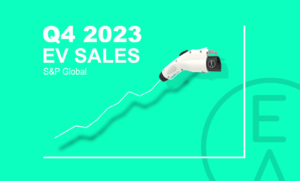Battery electric and plug-in hybrid vehicle market share was 13.2 per cent, down a fraction from Q3, but still well above Q2’s 10.5 per cent, according to S&P Global Mobility

According to data just published by S&P Global Mobility, battery electric vehicles (BEV) accounted for exactly 10.0 per cent of vehicles registered in Canada for the final three months of the year. Plug-in hybrids (PHEV) accounted for 3.2 per cent of registrations. Image: Electric Autonomy
Battery electric and plug-in hybrid vehicle market share was 13.2 per cent, down a fraction from Q3, but still well above Q2’s 10.5 per cent, according to S&P Global Mobility
Another quarter, another three months of strong zero-emission vehicle registrations in Canada that throw cold water — and hard data — on the widespread misconception that EV sales are slumping.
According to data published by S&P Global Mobility, battery electric vehicles (BEV) account for 10.0 per cent of vehicles registered in Canada for the final three months of the year. Plug-in hybrids (PHEV) accounted for 3.2 per cent of registrations.
These figures are essentially flat from Q3, when BEVs had 10.1 per cent share and PHEVs had 3.2 per cent. Considering that the previous quarter saw ZEV market share increase by a staggering 2.7 per cent over Q2, the Q4 results appear strong from a longer-trend perspective.
For the full year, S&P Global Mobility says ZEVs had an 11.7 per cent market share in 2023. That is up from 8.9 per cent for the full year in 2022. For BEVs alone, the 2023 share of registrations was 8.8 per cent, up from 7.0 per cent in 2022.

(Note: S&P Global Mobility, like Statistics Canada, classifies BEVs and PHEVs as “zero-emission vehicles.” The grouping does not reflect Electric Autonomy‘s view, which considers only non-combustion engine vehicles to be zero-emission. However, where statistics in this report refer to ZEVs, we have adhered to the S&P Global definition for consistency.)
Provincial Q4 2023 registrations
S&P Global Mobility’s Q4 report didn’t include a quarterly breakdown for provincial registrations, only annual figures.
For the year, British Columbia led the way with an 22.91 per cent ZEV market share. Quebec was in second place with 20.44 per cent. Yukon ranked third at 9.07 per cent, with Ontario next at 7.72 per cent, then Prince Edward Island at 7.4 per cent.
Quebec posted the biggest year-over-year percentage growth, with ZEVs increasing their market share by 7.27 per cent. B.C. was second, at 4.78 per cent. At the other extreme, Ontario, Alberta and Saskatchewan ranked last among the provinces, with ZEV share increases of 0.81 per cent, 0.77 per cent and 0.73 per cent, respectively.
When it comes to BEVs, B.C. led the way for 2023 with an 18.8 per cent market share of registrations. Quebec was second at 15.2 per cent. Yukon and Ontario tied for third at 5.9 per cent.
In terms of specific vehicle models, S&P Global Mobility says the Tesla Model Y was the dominant leader in 2023, accounting for nearly one in five (18.6 per cent) of all ZEV registrations. In Q4, S&P Global Mobility says “the spotlight for high volume increases … was shared by the Audi Q4 E-TRON and VW ID.4, both contributing significantly to the ZEV market.”






